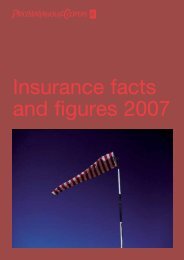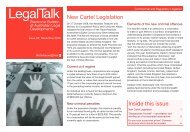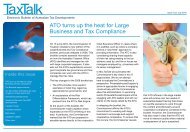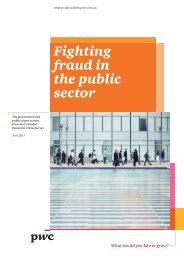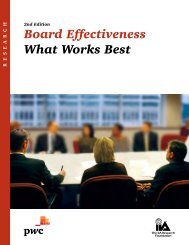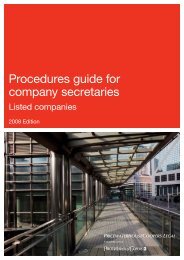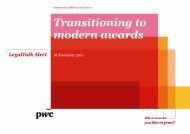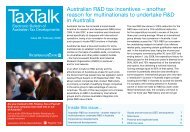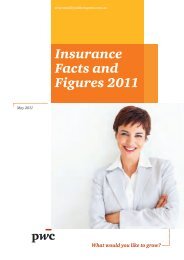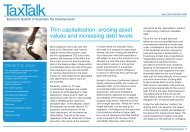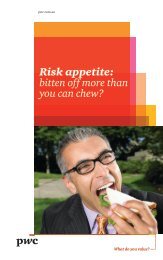Annual Review 2006 - PwC
Annual Review 2006 - PwC
Annual Review 2006 - PwC
Create successful ePaper yourself
Turn your PDF publications into a flip-book with our unique Google optimized e-Paper software.
AIFRS<br />
The implementation of new International Financial Reporting<br />
Standards to Australia – known as AIFRS – was the single<br />
largest change in the accounting framework since the Italians<br />
invented double entry in the 1400s.<br />
<strong>PwC</strong> continued major programs in three key areas to ensure a<br />
smooth transition: training staff; educating clients and the wider<br />
business community about the new standards; and arguing that<br />
Australia should follow the global IFRS model.<br />
<strong>PwC</strong> took a strong stance on the dangers of Australia diverging<br />
from the international model for IFRS and the decision of the<br />
Australian Accounting Standards Board (AASB) to include detailed<br />
Australian specifi c guidance in AIFRS. This activity included<br />
extensive education and lobbying efforts over three years, led by<br />
Jan McCahey, our Accounting Consulting Services Leader.<br />
Jan presented to the AASB and the wider business community,<br />
provided commentary to media and spoke at numerous events.<br />
<strong>PwC</strong> therefore welcomed the AASB’s April <strong>2006</strong> announcement that<br />
it would not add requirements or guidance to the Australian standards,<br />
except to deal with a public sector or not-for-profi t issue. The Board<br />
is also seeking to remove local guidance already provided.<br />
Internal<br />
Controls<br />
Another important initiative was the worldwide release of the<br />
IAS 39 – Achieving hedge accounting in practice guide. In AIFRS –<br />
the complex issues and the way forward, the fi rm confronted the<br />
primary concerns clients were still expressing a year after the<br />
changes. These included:<br />
Why are fi nancial reports longer under AIFRS?<br />
Why aren’t current standards wholly principles-based?<br />
What is happening with convergence relating to IFRS and<br />
USGAAP?<br />
Why is AIFRS so complex to apply in practice?<br />
What will happen with proprietary company reporting?<br />
With corporate governance high on the agenda of most<br />
business people, <strong>PwC</strong> commissioned a report from the<br />
Economist Intelligence Unit examining internal controls.<br />
This included responses from 77 executives on internal control<br />
efforts and their impact, and was featured in a cover story in CFO<br />
magazine in June <strong>2006</strong>. The key fi nding was that many companies<br />
were suffering ‘governance fatigue’ yet remained concerned about<br />
maintaining and improving an internal culture of control.<br />
Of the respondents, 36 per cent said their organisations have spent<br />
more than $1 million on internal controls in the past three years,<br />
with 17 per cent spending more than $5 million. The report noted<br />
these investments are not going to decline any time soon.<br />
However, in the 20 face-to-face research interviews with senior<br />
executives, it emerged that control regimes can only be as good as<br />
the culture they are embedded within. Interviewees said it was<br />
practically impossible to overcome someone determined to defraud<br />
an organisation and that the best defence was a culture of effective<br />
communication – a tone that must be set by the leadership team to<br />
encourage and emphasise ethical practices.<br />
In the CFO article, <strong>PwC</strong> outlined the importance of turning<br />
culture into a tangible element of the risk management strategy.<br />
Measurement must become outcome focused and include<br />
palpable indicators of health, such as employee engagement<br />
and absenteeism. Such indicators present a clear link to how<br />
effectively risk is managed and can help prevent wider negative<br />
impacts on the business.<br />
<strong>Annual</strong> <strong>Review</strong> <strong>2006</strong> 75



